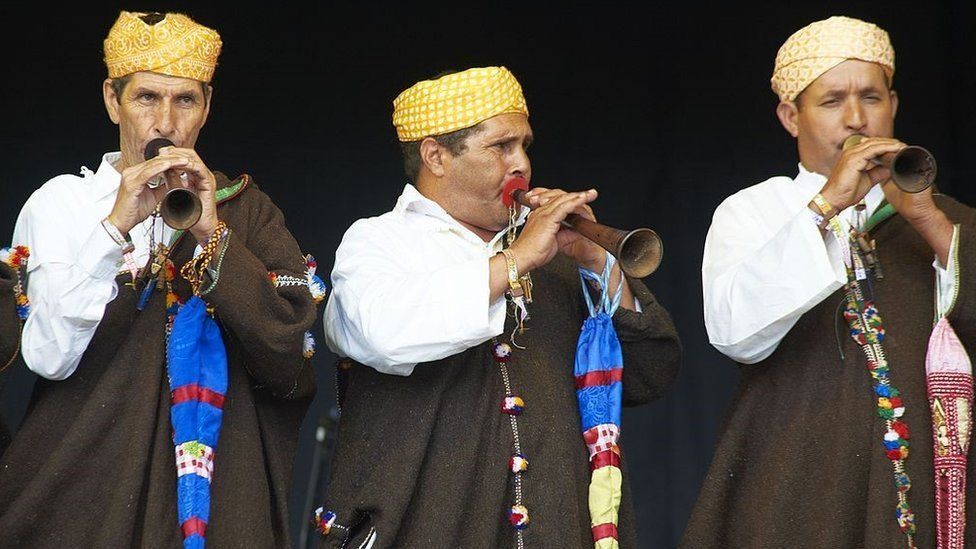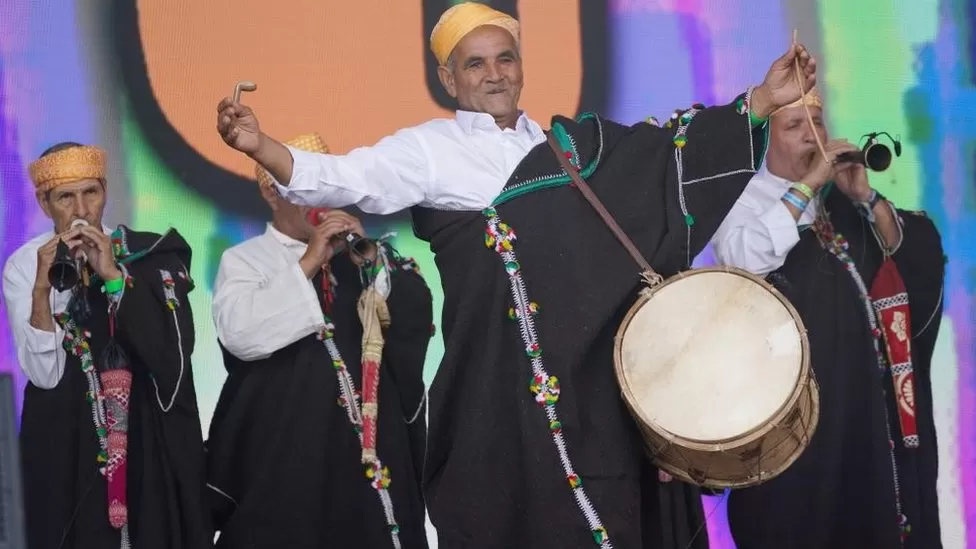For hundreds of years the Master Musicians of Joujouka have performed in their local village of the same name in northern Morocco, handing down their unique sounds of drums and pipes from generation to generation.
But recently they opened the Glastonbury Festival in the south-west of England, one of the world’s biggest open-air music events.
No-one really knows exactly how old the music is that echoes through the valleys and hills surrounding the village of Joujouka, in the foothills of the Rif mountains. Some research points to the tradition dating back to the 15th Century.
“Timothy Leary called it the 4,000-year-old rock ‘n’ roll band,” says Rikki Stein, who helped organise their performances at Glastonbury this year.
“It’s probably a bit of an exaggeration, but nevertheless it’s been passed down from father to son from time immemorial,” he tells the BBC.
Stein first stumbled upon the Master Musicians of Joujouka in 1971.
“I was so blown away by what I found there, that I tore up my return ticket and stayed in the village for a couple of years.”
By then the musicians had already been discovered by American counter-culturalists Paul Bowles and William Burroughs, as well as British-Canadian artist Bryon Gysin.
“I just want to hear that music for the rest of my life,” said Gysin, who added that he never let the sun go down without listening to the musicians.
Brian Jones, who founded the Rolling Stones, recorded the Master Musicians in 1968.
At that time, Bachir Attar was a shepherd boy from the village.
He remembers the rock-and-roll legend arriving all those years ago: “When Brian Jones came to the village, my little brother Moustapha came to me and said: ‘Somebody come with big hair.’ I ran and ran to see my father and I saw the man with big golden hair. I shook his hand and he looked great!”
Jones stayed for a night and a day but the music festival lasted for several days.
“I don’t know if I possess the stamina to endure the incredible, constant strain of the full festival,” wrote Jones on the album cover of his subsequent record, Brian Jones Presents the Pipes of Pan at Joujouka.
“Such psychic weaklings has Western civilization made of us.”

The Master Musicians create their other worldly sound with traditional Moroccan instruments. The pipes are called ghaitas and there are two drums: the zowak and farad.
“When I play the music I feel very happy – like a bird,” says Ahmed El Attar, sometimes referred to as the leader of the band.
“That’s why I want to play this music forever. If I ever feel angry or sad, I just listen to the music and suddenly I feel happy again. I feel like a bird, that is flying away,” he tells the BBC.
“When you play the ghaita, you become part of a great sound,” says another member of the troupe, Abdeslam Rrtoubi.
“I love seeing people moved by the music. It can also help me to play it on my own, whenever I need to calm myself. The audiences and the support we get from them with their dancing and their happiness is a gift to us.”
It takes years to learn the music properly.
In fact, says El Attar, it takes a lifetime to master.
“When I was young I danced and started to play the drum. I have been playing music since I was a small boy of about nine,” he says.
“When I was older I would be with the Master Musicians every day and the leader of the drummers, who was called Berdouz, helped me and other boys learn the music. It is not difficult if it is just your life.”
The sounds of Joujouka have their roots in Sufism but probably pre-date Islam.
Half-way up a hill above the village is a cave. This is where the ancient deity Boujeloud is said to live. He is half-man, half-goat and probably related to the Greek god Pan.
It is believed that Boujeloud brings the gift of fertility to Joujouka and he performs as the dance master, accompanying the musicians as they pound their drums and blow their pipes.
In the old days a goat was slaughtered and skinned. Then a small boy would be sewn up inside a goatskin, smeared with salt. The blood, sweat and salt was said to inspire mystical visions.

Nowadays the man inside the costume is Mohamed Hatmi, who runs a local café in the village.
But at night, during the annual festivals, he dances like a maniac and whips people with olive branches. It’s comic but somehow disturbing.
The village also has a shrine to a 15th Century saint, who brought Islam to Joujouka.
“In our village our saint is Sidi Ahmed Schiech,” says El Attar, “the music is his music. The music began with our saint and when we play it, he is in the music.”
In ancient times people who suffered from mental illnesses would be chained to a tree in the village and the musicians would blast their pipes within inches of the patient’s face. Once released, it was claimed that they would walk away, cured.
Today visitors come from as far afield as Japan and find dancing to the drums and pipes at the festival clears their heads and heals their souls.
“Joujouka music has baraka [blessings from God],” remarks El Attar. “The baraka comes from Sidi Ahmed Schiech. He was a healer and his sanctuary is a place people have visited since ancient times for healing. The instruments the musicians play and the place itself all heal people. People still come to be healed here and even when we are abroad people look for healing and help from us.”
But while there were 27 musicians in the 1980s, there are now only 11. Many of them are elderly and it is not clear if a new generation will emerge.
So are the musicians worried that this sacred ancient tradition may die out?
“Some people ask us about this,” says Rrtoubi, “but we don’t think this music can die. If it did, it would be a very bad thing. There are many changes happening in our village and in the world, but the children still love the music.”
“The music of Joujouka cannot disappear from here because the children who go to school in the village learn the music and it’s our heritage,” says El Attar. “If the music stopped in Joujouka, it would be as if there’s no more music in the world.”
